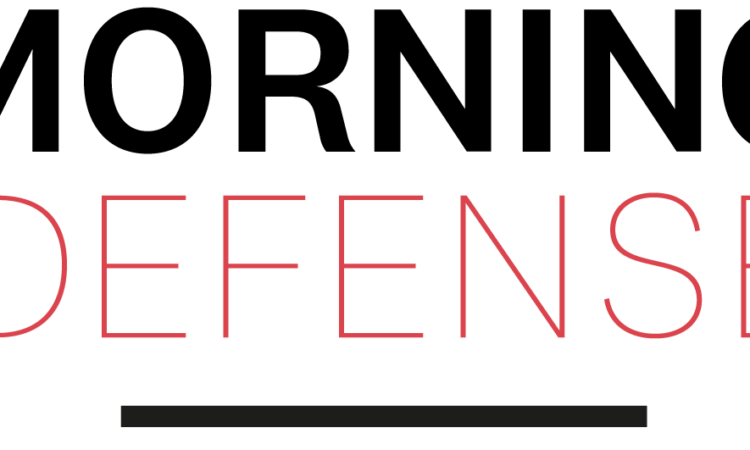
Press play to listen to this article
Voiced by artificial intelligence.
— The European Space Agency is assessing the spiralling costs of the long-delayed Ariane 6 rocket program.
— The German parliament’s budgetary committee approved €4.4 billion for air defenses and weapons to Ukraine.
— U.S. arms makers are very worried about a possible supply squeeze thanks to wars happening in both Israel and Ukraine.
Good morning and welcome to Morning Defense. Tips to jposaner@politico.eu, lkayali@politico.eu and clarson@politico.eu or follow us at @joshposaner, @LauKaya and @calebmlarson .
MORE CASH FOR ARIANE 6? The Ariane 6 heavy rocket launcher is now so delayed that the European Space Agency is considering pressing member countries to raise their contributions to counter the impact of inflation. The development of the €4 billion rocket program has “changed significantly” since 2021, the ESA’s Director of Space Transportation Toni Tolker-Nielsen told Josh.
ESA is compiling a “detailed assessment” of the impacts of inflation and delays on the rocket program given that key contractors, Airbus and Safran, have asked for more cash to fund development. “Once that assessment is made, a proposal will be made to member states,” Tolker-Nielsen said. T
Strategic autonomy? Ariane 6 is in danger of turning into a fiasco for the ESA and France’s aerospace industry. Since being commissioned a decade ago, Ariane 6 has been surpassed by Elon Musk’s SpaceX which has slashed the cost of launches with its partially reusable rocket technology. Because its predecessor Ariane 5, a super reliable commercial launcher, has already been retired, the European Commission is even having to look to SpaceX to get its satellites into orbit. That’s exactly the kind of outsourcing Paris wants to avoid in its focus on building strategic autonomy.
Get ready for pay day: ESA convenes a regular meeting of its member states on November 6 and 7 in Seville.
Now for the good news: Engineers will try again to carry out a hot-fire test of the Ariane 6 rocket main stage on November 23, after the last try on October 3 had to be postponed. “After that I will be in a position to give a launch period,” Josef Aschbacher, ESA’s director general, told media on Thursday. “It is planned to be in 2024 but exactly when, it is too early to say.”
 |
EU-US SUMMIT: Senior EU officials, including European Commission President Ursula von der Leyen, are in the White House today for talks with U.S. President Joe Biden. The summit will cover everything from trade to weapon deliveries to Ukraine. We already brought you news that a joint statement is set to commit to more joint military exercises.
GERMANY: On October 23, the American Academy in Berlin will host China expert Elizabeth Economy to discuss U.S.-China relations. The event starts at 19:30 to 21, and Caleb will be in attendance.
**A message from ASD: Without security, there can be no sustainability. For example, 90% of Ukraine’s wind power capacity and 50% of solar energy capacity have been taken offline as a result of Russia’s invasion. Therefore, European defence companies, which produce equipment for Europe’s common security, are an indispensable part of a sustainable society. Learn more in our ASD Paper.**
IRIS2 CONTRACTS DUE NEXT YEAR: The European Commission and European Space Agency are zoning in on a deal with a consortium of major aerospace companies to build the IRIS2 communication constellation, according to ESA’s point person on the program Francisco-Javier Benedicto Ruiz.
Competing with Elon: An Airbus-led consortium has offered to build the network as a European alternative to SpaceX’s Starlink internet network. According to Benedicto Ruiz, a final offer should be agreed with the consortium by the end of the year and there will be a “contract signature in early 2024.” The Commission has raised €2.4 billion for the plan, while ESA members have committed an extra €750 million.
MORE GERMAN DEFENSE SPENDING: The Bundestag’s budget committee approved withdrawing €4.4 billion from the Bundeswehr’s €100 billion special fund, set up last year by Chancellor Olaf Schulz in response to the Russian invasion of Ukraine, for several procurement and development projects. The budget committee also approved additional spending from this year’s defense budget.
Divvied up: About €4 billion goes to the Arrow air defense system, a joint Israeli-American scheme that included Arrow 3 missiles, spare parts, and training; €40.5 million for upgraded encrypted communications phones and communications equipment for the Patriot air defense system; €67 million for Parm DM22 anti-tank mines to replace those supplied to Ukraine; €52.5 million will be taken from the regular defense budget for four Long-Range Autonomous Underwater Vehicles (LR-AUV), an unarmed drone, as well as the option for a fifth; and €51.5 million for satellite navigation devices.
Pleased as pie: “We are investing in national and alliance defense capabilities,” German Defense Minister Boris Pistorius said, adding that he is “delighted about the parliamentary support.”
PISTORIUS IN LEBANON: The defense minister flew to the United Nations Interim Force in Lebanon (UNIFIL) “on short notice” to get info on how the conflict in Israel and Gaza affects the German contingent in Lebanon.
BERLIN EXTENDS IRAQ MANDATE: Germany moved to extend Berlin’s military contributions to Operation Inherent Resolve, the American-led international campaign against ISIS, and to NATO Mission Iraq for one year. The current mandate runs until October 31.
No front-line role role: The defense ministry said the goal is to “enable the Iraqi armed forces to guarantee the security of their country themselves.” German involvement consists about 500 troops working as advisory personnel, air transport, air-to-air aircraft refueling and air surveillance flights.
NATO STEPS UP BALTIC PATROLS: The alliance is dispatching drones and maritime patrol aircraft to boost surveillance and reconnaissance in the Baltic Sea between Estonia, Finland and Russia. That’s following damage to an undersea pipeline over recent days.
Stuart and Josh have more here.
BELGIUM NEGOTIATING FIREARMS DEAL: The Belgian government is in talks with Belgian firearms manufacturer FN Herstal on a €1.7 billion 20-year contract to boost small-caliber arms production lines to produce weapons for both the police and the army, reports L’Echo.
NEW DELIVERIES: The French arms procurement agency has delivered six new Serval lightweight multirole armored vehicles to the army, bringing the total number to 150. Under the Scorpion program, the army is expected to receive 978 Servals by 2035. The procurement agency has also received two new Caesar artillery systems that will replace donations made to Ukraine.
SWEDEN GETS NEW FIGHTER: Saab delivered the first series-production JAS 39E Gripen fighter jets to the military earlier this month. Slightly larger than its predecessors, the E series carries more fuel — offering longer range — a larger weapon capability and updated radar and electronics.
Pilot’s view: The announcement (available here in Swedish) features an interview with a veteran Swedish fighter pilot and has more details on Sweden’s newest jet.
US FEARS AMMO SQUEEZE: The need to rush military supplies to Ukraine and Israel is creating an “inflection point” for America’s defense industry, said Dak Hardwick, vice president of international affairs at the Aerospace Industries Association, an industry trade group, our U.S. colleagues report. “There has not been a time in the past 30 years where you essentially have had two real conflicts happening at the same time with a potential third one in three different regions of the world,” he said, referring to a potential Chinese invasion of Taiwan.
Shell shock: While Ukraine is fighting a different type of war than Israel, there are weapons that both countries want from the U.S. Those include 155mm artillery shells, along with air-launched small diameter bombs, joint direct attack munitions and Hellfire missiles. And those demands will only grow as the two wars grind on and the U.S. continues to ready itself for any potential clash with China.
ESTONIA BUYS TURKISH ARMORED VEHICLES: Estonia signed a 10-year deal with Turkish companies Nurol Makina and Otokar for 230 wheeled armored vehicles. “The best bids were selected based on the fastest delivery time and price,” said Karmo Saar, a top official from the Estonian defense agency. The first vehicles are expected to be delivered as early as next year. On top of the procurement contracts, Estonia’s Defense Minister Hanno Pevkur and his Turkish counterpart Yaşar Güler signed a letter of intent to deepen defense industry cooperation.
TNT for USA: Polish chemicals company Nitro-Chem says it is one of four companies chosen by the U.S. Army to supply trinitrotoluene for artillery shell production.
EU FUNDING FOR DIGITAL TRAINING AND SIMULATORS: The European Union selected a Rheinmetall-led consortium of 32 defense companies from 15 countries called Federates, for €30 million in funding to create a common network integrating existing digital simulators and training systems.
**Playbook is going global! We’re proud to introduce Global Playbook, POLITICO’s premier newsletter that brings you inside the most important conversations at the most influential events in the world. From the front rows of Davos, COP, and more, straight to your inbox. Sign up today.**
FRANCE PIVOTS FROM CRISIS MANAGEMENT TO ‘COLLECTIVE DEFENSE’: The French army still needs to be able to intervene abroad, but Paris is currently increasingly focusing on “collective defense,” army chief General Pierre Schill told reporters on Thursday.
European structure: France recently created a land command for Europe because of increased deployments on the Continent, Schill said, speaking on the margins of the army’s day-long equipment presentation. France has 300 troops in Estonia, is training Ukrainians in Poland and is a so-called framework nation in Romania.
The command unit will coordinate French troops before they switch under NATO or allied country command, and will continue to provide logistics support. “Above all, it’s a marked and assertive return to the question of collective defense, in Europe and also in the Middle East with the defense agreements we have,” Schill said. The probability of “a situation that involves triggering collective defense mechanisms” has increased, and France needs to be prepared, he said.
More military exercises: France will do more large-scale exercises with allies in the future, especially in Romania, Schill said. The “distinction between operation, training and exercise is becoming blurred,” he added, because large-scale exercises such as France’s Orion earlier this year are also demonstrations of force to the outside world.
SWEDISH RECOILLESS RIFLES TO JAPAN: The Japan Self-Defense Forces ordered 300 Carl-Gustaf recoilless rifles from Saab.
AUSSIES WON’T SCRAP CHINA’S LEASE OF KEY PORT: Australia won’t scrap a 99-year lease on the strategic Port of Darwin held by a Chinese company, after a federal government review found that move wasn’t necessary. Write-up here.
THANKS TO: Jan Cienski and Zoya Sheftalovich.
**A message from ASD: Sustainability has become a leitmotiv for the European Union and a key driver for policies, economies and societies at large. At the same time, there is an intrinsic link between sustainability and defence. As suppliers of our armed forces, European defence companies make an indispensable contribution to Europe’s security, and thereby help to protect Europe’s peaceful, democratic and sustainable social development. Despite the acknowledged importance of defence for security and sustainability, many banks and investors remain reluctant to support defence activities. This deprives our industry from the investment it needs to support our armed forces. Allowing the European Investment Bank to invest in core defence activities would send send a strong message to the financial community that supporting Europe’s defence industry is compatible with sustainability objectives.**





